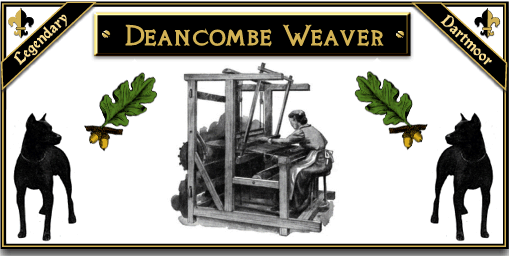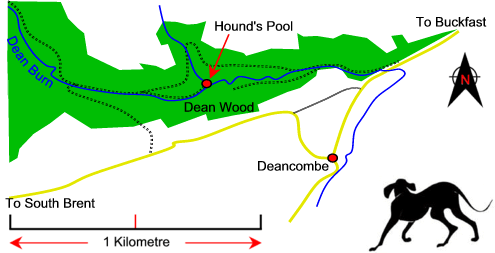
“By day the place was inviting enough and a child wouldn’t have feared to be there. Dean Burn came down from its cradle far away in the hills and threaded Dean Woods with ripple and flash and song. The beck lifted its voice in stickles and shouted over the mossy apron of many a little waterfall; and then under the dark of the woods it would go calm, nestle in a backwater here and there, then run on again. And of all fine spots on a sunny day the Hound’s Pool was finest, for here Dean Burn had scooped a hole among the roots of forest trees and lay snug from the scythe of the east wind, so that the first white violet was always to be found upon the bank and the earliest primrose also. In winter time, when the boughs above were naked, the sun would glint upon the water; and sometimes all would be so still that you could hear a vole swimming; and then again, after a Dartmoor freshet, the stream would come down in spate, cherry-red, and roll big waters for such a little river. And then Hound’s Pool would be like to rise over its banks and drown the woodman’s path that ran beside it and throw up sedges and dead grasses upon the lowermost boughs of the overhanging thicket to show where it could reach sometimes. ‘Twas haunted, and old folk–John Meadows among ’em–stoutly maintained that nothing short of Doomsday would lay the spectrum, because they knew the ancient tale of Weaver Knowles, and believed in it also; but the legend had gone out of fashion.” – Eden Phillpotts, Phillpott’s Tales.
Deancombe is a small sleepy hamlet that is tucked under the southern edge of Dartmoor. This was a busy cloth producing area with Buckfast as its centre. Many years ago there was a weaver called Knowles living in a tiny house in Deancombe. He was reputed to be one of the most clever and skilful weavers on Dartmoor. His weft was taught and his weave straight and always the finished knap was of the highest quality. One would have thought that with all his talent he would be a contented soul but no far from it. Alongside his long list of skills ran a long list of his faults. His neighbours considered him to be greedy, selfish, evil and a wicked ‘wag-tongue’ (gossip), basically he was despised throughout the area. But despite this Knowles prospered and became very rich soon adding ‘miserly’ to his list of traits. Every day he would sit up in his weaving loft and work from sun rise to candle snuff. The old shepherds up on the moor would often use his candlelight as a beacon to walk home. If the weaver knew this he would probably have charged them for the privilege. But death is a great leveller and one day, sat at his loom he passed away. Oddly enough, although he was much hated his funeral was a splendid affair, mourners came from all over the area and it is said that the food and drink at his wake was as plentiful as a Harvest Home. As the ale and cider flowed people wished old Knowles a safe journey and all gave their condolences to his son Fernley. Now Fernley came from a different mould to his father, he was kind, caring and generous to a fault and this was probably why so many people came to the funeral, not for the memory of his father but to support Fernley. Once the last mourners ‘cider swayed’ their way home Fernley lit a candle and climbed up the creaky stairs to his bedroom. Lying in bed he started to think of his future, clearly money was not going to be a problem but somehow he had now to prove that his weaving skills were as good as his fathers, after all it was he who had taught Fernley the skills of the trade. So as his eyes started to close he vowed to be up at first light to continue the family business. The following morning he woke with the crowing of the dunghill cock and went downstairs to make some breakfast. The first job of the day was to light the peat fire and as he stacked the turves on the hearth he heard a familiar but heart stopping sound, for coming from the upstairs weaving loft was the steady clunk, clunk of the loom. Initially he dismissed it as being the open window blowing in the breeze. But then he realised that it was too rhythmic for that, it was definitely somebody working the loom. With clammy palms gripping the banister he edged his way up the stairs and softly walked to the weaving loft door. Somebody was working the loom and as he peeked through a crack in the door he saw who – it was the ghost of his father. There was a chill in the air and a pungent fusty smell coming from the room, Fernley found himself transfixed, what should he do? His first thought was to get out of the house which he managed to do at great speed. Once outside in the clear morning air he knew he must get help and probably the best place for that was the local priest. He ran straight down to the church and luckily found the vicar saying his morning prayers. He explained his ghostly encounter and apart from stopping to get his ‘bell, book and candle’ the priest rushed up to the weavers cottage. The two men stood in the kitchen and listened to the sound of the loom. The priest went to the bottom of the stairs and in a stern voice demanded that the lost soul “come down stairs”, nothing stirred, the priest then said “this is no place for a lost soul, come down and return to your grave”. The loom stopped and an eerie voice replied ” I will as soon as I’ve worked out my quill” (shuttle full of wool). The priest was having none of it, “No, get down here this minute, your life’s work is done and it is time to return to your resting place under the churchyard yew”. Amazingly the loom fell silent and the ghost along with its stench and chill came downstairs. As the weaver’s spectre came into the room the priest threw some holy water into its face and then recited a prayer whilst at the same time ringing the bell. The ghost let out a spine chilling scream and before their eyes turned into a huge black dog. With bible in hand the priest commanded the dog to heel and led it outside, down the lane and into Dean Wood. Here the procession climbed up the burn until they came to a pool. The priest walked over to an old oak tree and picked up an acorn shell. This he gave to the dog and said “take this shell and when you have emptied this pool with it you will be granted eternal rest”. The ghost of the old weaver was never seen again but to this day the moorfolk will never go near that pool at noon or midnight because it is said that when the church clock strikes twelve the black dog can be seen frantically trying to bale out the pool with the acorn shell.

This story is also found in the ‘Songs of the Dean Burn’ and is called ‘The Ballad of the Hound’s Pool:
Deep in the churchyard Knowles was laid-
The Weaver of Dean Coombe;
But short time that weaver stayed
Within the silent tomb!
None ever looked old Knowles to see
Until the crack of doom;
But there is astral body he
Sat working at his loom!
The wondering neighbours roundly swear
That through the livelong night
His wheel and shuttle they can hear-
For no ghost needs a light!
And as beneath his narrow stair
They terror-stricken stood,
All horrid rose each listener’s hair
All curdled grew his blood!
Then up there spake old Abraham Steer.
Says he, “My lads, ’tis plain
We’d best get our old Parson here
To lay old Knowles again.”
They hurried off to Dean Church Town.
“Oh, Parson dear, come quick!
Old Knowles you buried won’t stay down;
He’s back-or else old nick!”
The Parson fetched the Holy Rood,
And to them calmly said,
“With this I fear not flesh and blood,
With this I’ll face the dead.”
Then slow and stately up the hill
Aloft the cross he bore,
First of that dumb procession, till
He stopped at Knowles’s door.
Then loud he cried, “Thou miser soul,
Who mad’st this earth thy home,
With sordid riches for they goal,
Come down! I bid thee come!”
“No marvel that thou can’st not sleep,
Though laid in holy ground;
But back to thy poor lodge dost creep,
Where all thy heaven is found.”
Then straightly that lean ghost came down,
As pale as pale could be;
The Parson with his sternest frown
Said, “Knowles, you follow me.”
All up the stream did Parson lead
All up between the wood,
Past clitters and past Biddy Mead,
Till at the pool he stood.
There, ‘mid the roar of waters white
Which echoing rocks resound,
He turned old Knowles’s trembling sprite
Into a coal-black hound.
“Thou who did’st toil for earthly dross,
I give thee toil,” he said,
“That thou may’st learn how great thy loss,
Though earthly toil has sped.”
“Take thou this nutshell, bale the Pool,
And when thy task is o’er,
A human form shall veil thy soul
And thou have peace once more.”
Should you, my reader, fondly ask
If this old tale be true,
Go list the hound still at his task;
I’ll show the Pool to you!
And if you’re not devoid of sense,
And keep an open mind,
Here’s circumstantial evidence
Of most convincing kind.
For here’s the Pool! and here’s the Wood!
And here’s old Knowles’s door!
And here’s the place where Parson stood! –
What can a man have more?
Rev. C. J. Perry Keene.
 Legendary Dartmoor The many aspects past and present of Dartmoor
Legendary Dartmoor The many aspects past and present of Dartmoor
